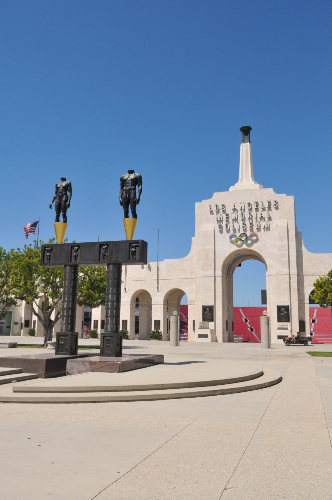
On July 1, college athletes became eligible to benefit financially for the first time from the use of their name, image and likeness.
The NIL ruling by the NCAA, the governing body for college sports, means college stars can be paid to endorse products and services on social media and can make money to appear in print ads, on radio and TV commercials and at personal appearances.
The time may soon come when you’ll be lured to a local car dealership by a radio commercial featuring a UCLA basketball player and be greeted upon arrival with a long line of folks waiting to pay for an autograph from a USC football star.
It’s something a lot of people thought would never happen. The roots of the change go back a dozen years when former UCLA basketball star Ed O’Bannon first filed his NIL-related lawsuit.
Now that the dam has broken, there’s a level of opportunity that college stars of the past could only dream about. When NIL went into effect, former USC quarterback and Heisman Trophy winner Matt Leinart tweeted, “I want to go back to college!”
Who stands to benefit?
Who stands to benefit?
That’s because NIL rules are so new, the possibilities so vast and potentially beneficial or problematic, that those whose job it is to work within them liken it to either discovering a long-sought mythological creature or the lawless Old West.
Craig Pintens, athletic director at Loyola Marymount University, acknowledged there are likely to be conflicts along with “tremendous opportunities. Right now, it’s the Wild West.”
Things are so up in the air that college athletic programs are hesitant to talk on the subject. USC has declined to give any comment, perhaps because its athletes could potentially make the biggest splash locally. One athletic department official said the school was holding off on talking because “we want to wait and see how it all shakes out.”
Oh, it’s shaking. Trojan quarterback Kedon Slovis has already signed on with Klutch Sports, the same agency that represents LeBron James. USC defensive lineman Nick Figueroa can be seen beaming as he stands next to a new Tesla, apparently his, on a sponsored Instagram post for the car company.
“My new shi!” Figueroa wrote. “Appreciate ya @teslamotors & NCAA!”
The same is true across town at UCLA where Johnny Juzang, who led UCLA to the Final Four, pulled out of the National Basketball Association draft because of the potential opportunities NIL presents for him in Westwood. Bruins soccer player Kaila Novak has already signed with a talent agency based on her considerable, and entertaining, reach on social media.
With the college sports season yet to start, a lot of NIL news has been about athletes and agencies positioning themselves. Century City-based Creative Artists Agency signed University of Alabama quarterback Bryce Young, who played at Mater Dei High School in Santa Ana. VaynerSports, an agency with offices in Los Angeles and New York, did the same with Clemson University quarterback DJ Uiagalelei, who played at St. John Bosco High School in Bellflower.
The kind of wide-open spaces presented by NIL is something marketers dream about, according to AJ Vaynerchuk, who co-founded VaynerSports and advertising firm VaynerMedia with his brother Gary.
“NIL has been circled as a bit of a unicorn that I wasn’t sure was ever going to happen,” he said.
While Vaynerchuk will likely pursue athletes who can command a national stage, marketing experts say the majority of athletes who take advantage of NIL will do so with local businesses.
Don’t be surprised to see or hear local athletes giving the thumbs up for a neighborhood business. Endorsements of local restaurants are especially likely, according to experts.
Consider that the offensive lines of the universities of Arkansas, Notre Dame and Wisconsin have already signed on to endorse local barbecue and pizza restaurants.
One executive, who requested their name not be used, said that what makes a college athlete more attractive to a local business than a professional is the likelihood of a smaller fee.
Plus, the exec added, “They still represent a bastion of amateurism. They’re attractive (to advertisers) because they bring with them a certain perception of purity and a demographic that is fiercely loyal and usually very regional.”
Lots of money to go around
Lots of money to go around
“Los Angeles is the most diverse city in the world, and that team reflects it,” the exec said. “Everyone has someone to cheer for on that team.”
There’s a lot of money to go around.
Mindful of that, USC has put together a lengthy NIL policy document that deals with everything from professional representation to conflicts with USC team contracts to boosters.
Still, near the beginning of the document, it acknowledges that, “this policy is expected to evolve over time as laws, rules and guidance change, and as the university learns more about how to best foster this new opportunity for its student-athletes.”
In a first-person account in the Los Angeles Times, O’Bannon, now a juvenile probation officer in Clark County, Nev., said, “I know people are excited for college athletes to be able to use their NILs. I’ll keep up, check them out and see what they’re doing, but again, my job is done. … I will watch from a distance. I just hope everybody is happy.”
Who will be and, perhaps who won’t, remains to be seen, but the undeniable fact is that this has changed everything. The question now, and it’s a pricey one, is how?
“Everyone wants to know what is going to happen. There will no doubt be more opportunity, but it’s going to take a while to sort out, to normalize,” Pintens said. “We’ll have answers then. Right now, there’s pretty much only questions.”
